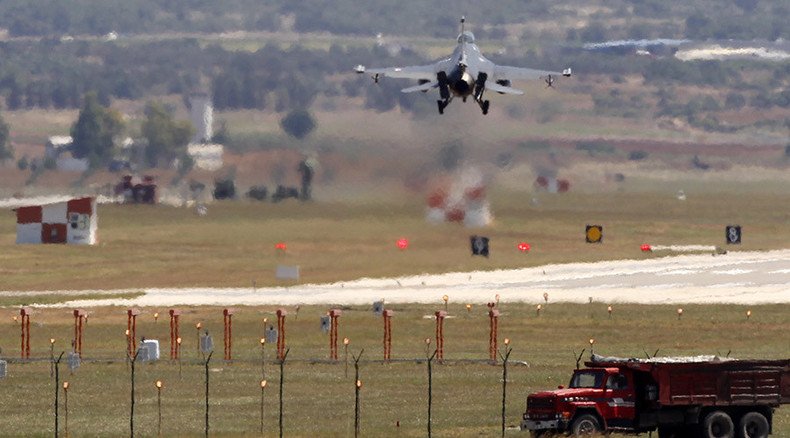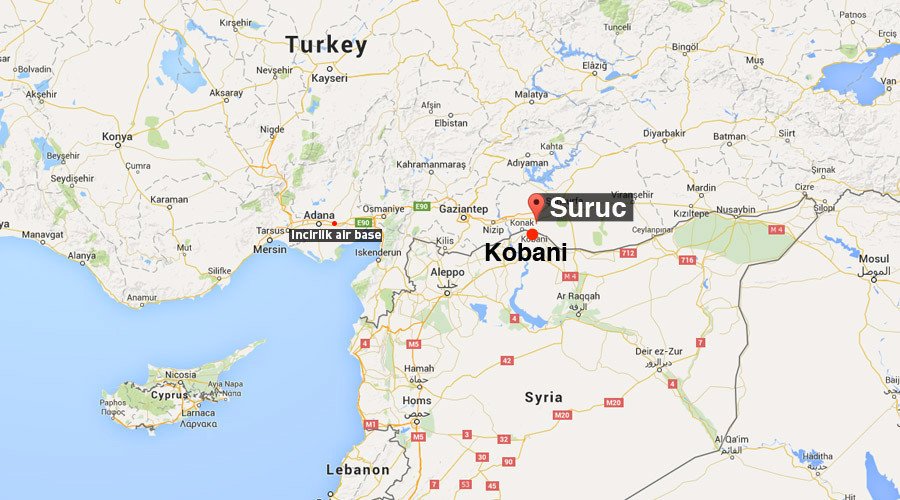Turkey joins US-led coalition against ISIS, provides jets & air bases

Ankara will join the anti-ISIS coalition by providing jets and airbases as part of an agreement with the US, the country’s foreign ministry said in a statement citing the growing threat to Turkey’s security posed by the jihadists.
“Turkey and the US have decided to deepen ongoing cooperation in the fight against Daesh [Arabic acronym for ISIS],” the Turkish Foreign Ministry statement said on Friday.
President Recep Tayyip Erdogan confirmed on Friday that Ankara has agreed to let the US use the Incirlik air base located near the city of Adana in southern Turkey for the coalition’s military operation against the jihadists. He told reporters that it will be used “within a certain framework.” The US Air Force contingent of about 5,000 airmen has been stationed there under an agreement between the two states as of 2002.
“Based on the authority provided by the Parliament on Sept 2nd, 2014, the Cabinet approved the deployment of manned and unmanned aerial vehicles of the United States and some regional countries joining aerial campaigns against Daesh [ISIS] in our bases. Turkish Air Forces will also be instructed in mentioned operations,” the Foreign Ministry statement said, as quoted by the Hurriyet daily.
In return for Washington’s use of Incirlik, Ankara has asked the US to establish a no-fly zone over Syria and a “security zone” along the Turkish border, according to Deputy Prime Minister Bulent Arinc who outlined the deal on Wednesday. Citing Turkish sources the daily Hurriyet reported on Friday that a 90 km no-fly zone will stretch from the northern Syrian towns of Mare and Cerablus and will be 40 to 50 kilometers deep.
The security line is aimed to prevent radical groups from capturing land beyond the border. The daily’s sources added that the coalition forces’ jets will provide security over the land “when needed,” carrying out “attacking or exploration” flights.
On Thursday, US media cited unnamed officials saying that Turkey has agreed to allow the US to launch air strikes from the bases at Incirlik and Diyarbakir following a phone conversation between the two heads of states on Wednesday.
READ MORE: US to use Turkish airbases in war against ISIS - reports
"In our phone call with Obama, we reiterated our determination in the struggle against the separatist organization [Kurdistan Workers' Party (PKK)] and the Islamic State," Erdogan told reporters on Friday. "We took the first step last night."
Late Thursday night, three Turkish F-16 jets successfully hit three IS targets within Syria without violating the Syrian airspace, according to PM Ahmet Davutoglu's office.
The jets were deployed from the Diyarbakir air base located in Southeastern Anatolia close to the border with Syria, according to Turkey’s TRT television. The media added that the Islamic State (IS, formerly ISIS/ISIL) targets were located in the Syrian village of Havar, across the border from the Turkish province of Kilis. Turkey’s Hurriyet newspaper said that two of the targets were supposedly IS headquarters.
Local broadcasters NTV and CNN Turk reported that Turkish jets launched a fresh on IS positions entering Syrian airspace late of Friday.
The foreign ministry said on Friday that the airstrikes had been carried out within the frame of article 51 of the UN that stipulates the right to self-defense.
The US has been leading the anti-IS airstrike campaign since mid-2014, flying from the Gulf states, Iraq and Jordan to conduct attacks on militant positions. Turkey’s willingness to provide its airbases will give the coalition advantage in speed and surveillance over Syria.
While supporting the Syrian opposition in its neighbour’s civil war, Turkey has often been accused of turning a blind eye to foreign radicals passing through the country en route to Syria in the hope they would help to overthrow President Bashar Assad more quickly.
The increased insecurity across the Turkey-Syria border has led to several firefights between the Turkish army and the IS, with the latest on Thursday leaving five militants and one soldier dead. It was preceded by a Monday attack in which 32 people were killed and more than 100 people wounded as an IS suicide bomber attacked a cultural center in the mostly Kurdish border town of Suruc. This was the first IS planned attack on Turkish territory.

READ MORE: At least 30 killed, 100 injured in 'terrorist attack' on Turkish town near Kobani
The Kurdish forces have been fighting IS militants, who committed atrocities against Kurdish minorities in a campaign they believe will “purify” the territory of non-Islamic influences. The Kurds are an ethnic group, culturally and linguistically related to Iran, and is one of the largest groups without its own state in the world. The Kurdistan region spans adjacent parts of Iran, Iraq, Syria, and Turkey.
Erdogan strongly opposes greater Kurdish autonomy in Syria and Iraq and Ankara has watched the recent advances by the Syrian Kurdish militia (YPG) against IS with concern.












